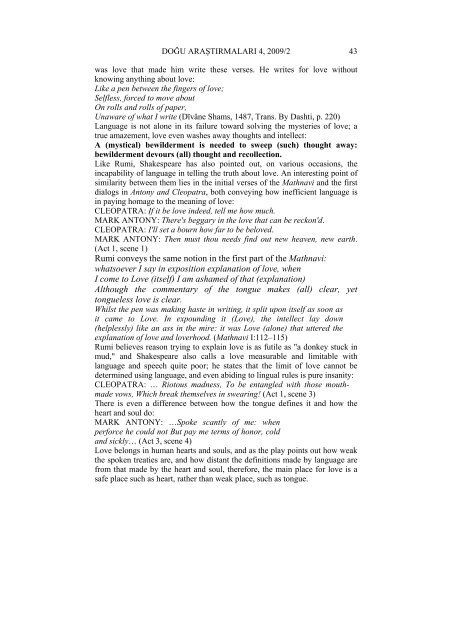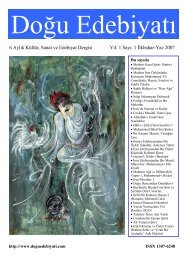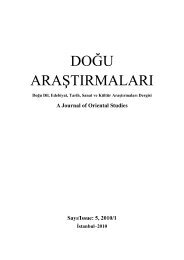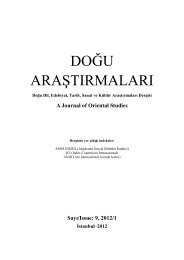A Journal of Oriental Studies Sayı/Issue - Doğu Edebiyatı
A Journal of Oriental Studies Sayı/Issue - Doğu Edebiyatı
A Journal of Oriental Studies Sayı/Issue - Doğu Edebiyatı
Create successful ePaper yourself
Turn your PDF publications into a flip-book with our unique Google optimized e-Paper software.
DOĞU ARAŞTIRMALARI 4, 2009/2 43<br />
was love that made him write these verses. He writes for love without<br />
knowing anything about love:<br />
Like a pen between the fingers <strong>of</strong> love;<br />
Selfless, forced to move about<br />
On rolls and rolls <strong>of</strong> paper,<br />
Unaware <strong>of</strong> what I write (Dīvâne Shams, 1487, Trans. By Dashti, p. 220)<br />
Language is not alone in its failure toward solving the mysteries <strong>of</strong> love; a<br />
true amazement, love even washes away thoughts and intellect:<br />
A (mystical) bewilderment is needed to sweep (such) thought away:<br />
bewilderment devours (all) thought and recollection.<br />
Like Rumi, Shakespeare has also pointed out, on various occasions, the<br />
incapability <strong>of</strong> language in telling the truth about love. An interesting point <strong>of</strong><br />
similarity between them lies in the initial verses <strong>of</strong> the Mathnavi and the first<br />
dialogs in Antony and Cleopatra, both conveying how inefficient language is<br />
in paying homage to the meaning <strong>of</strong> love:<br />
CLEOPATRA: If it be love indeed, tell me how much.<br />
MARK ANTONY: There's beggary in the love that can be reckon'd.<br />
CLEOPATRA: I'll set a bourn how far to be beloved.<br />
MARK ANTONY: Then must thou needs find out new heaven, new earth.<br />
(Act 1, scene 1)<br />
Rumi conveys the same notion in the first part <strong>of</strong> the Mathnavi:<br />
whatsoever I say in exposition explanation <strong>of</strong> love, when<br />
I come to Love (itself) I am ashamed <strong>of</strong> that (explanation)<br />
Although the commentary <strong>of</strong> the tongue makes (all) clear, yet<br />
tongueless love is clear.<br />
Whilst the pen was making haste in writing, it split upon itself as soon as<br />
it came to Love. In expounding it (Love), the intellect lay down<br />
(helplessly) like an ass in the mire: it was Love (alone) that uttered the<br />
explanation <strong>of</strong> love and loverhood. (Mathnavi I:112–115)<br />
Rumi believes reason trying to explain love is as futile as "a donkey stuck in<br />
mud," and Shakespeare also calls a love measurable and limitable with<br />
language and speech quite poor; he states that the limit <strong>of</strong> love cannot be<br />
determined using language, and even abiding to lingual rules is pure insanity:<br />
CLEOPATRA: … Riotous madness, To be entangled with those mouthmade<br />
vows, Which break themselves in swearing! (Act 1, scene 3)<br />
There is even a difference between how the tongue defines it and how the<br />
heart and soul do:<br />
MARK ANTONY: …Spoke scantly <strong>of</strong> me: when<br />
perforce he could not But pay me terms <strong>of</strong> honor, cold<br />
and sickly… (Act 3, scene 4)<br />
Love belongs in human hearts and souls, and as the play points out how weak<br />
the spoken treaties are, and how distant the definitions made by language are<br />
from that made by the heart and soul, therefore, the main place for love is a<br />
safe place such as heart, rather than weak place, such as tongue.





